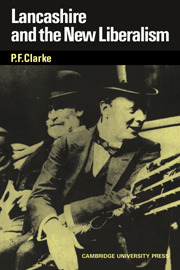Book contents
- Frontmatter
- Contents
- Preface
- Abbreviations
- Dedication
- PART ONE INTRODUCTION
- PART TWO FORMATIVE INFLUENCES
- 2 Manchester School to Tory Democracy
- 3 The Conservative Party at prayer
- 4 Cotton
- PART THREE THE TERMS OF THE CONTEST
- PART FOUR THE RECONSTITUTION OF LIBERAL LANCASHIRE
- PART FIVE FIELDS OF RECRUITMENT
- PART SIX GOING TO THE COUNTRY
- PART SEVEN CONCLUSION
- APPENDICES
- Bibliography
- Index
2 - Manchester School to Tory Democracy
Published online by Cambridge University Press: 23 November 2009
- Frontmatter
- Contents
- Preface
- Abbreviations
- Dedication
- PART ONE INTRODUCTION
- PART TWO FORMATIVE INFLUENCES
- 2 Manchester School to Tory Democracy
- 3 The Conservative Party at prayer
- 4 Cotton
- PART THREE THE TERMS OF THE CONTEST
- PART FOUR THE RECONSTITUTION OF LIBERAL LANCASHIRE
- PART FIVE FIELDS OF RECRUITMENT
- PART SIX GOING TO THE COUNTRY
- PART SEVEN CONCLUSION
- APPENDICES
- Bibliography
- Index
Summary
I am very well aware that a man may be joined to a ‘Radical Association’, to the ‘Working Man's Association’, and to a ‘Political Union’, and all will be right and square; but only let a man be a member of an Operative Conservative Society, why astonishment is at once excited, and the exclamation made, ‘I cannot for the world see why a man is to be a Conservative operative’.
William Paul, 1838To look at Lancashire is to look at the oldest industrial society in the world and at the landscapes of L. S. Lowry. ‘Do you know Burnley?’ asked H. M. Hyndman. ‘If not, don't.’ He recalled the impression that this not untypical cotton town made upon him: ‘There it lay in the hollow, one hideous Malebolge of carbon-laden fog and smoke, the factory chimneys rising up above the mass of thick cloud like stakes upon which, as I said to my companion, successive generations of the workers and their children had been impaled.’ Charles Rowley, who founded the Ancoats Brotherhood in the slums of Manchester and provided a prototype for Toynbee Hall, declared that in Lancashire and the West Riding, ‘we have a population of some seven millions, and no tree’, but took the view that ‘the materialistic advantage is undoubted’. Such considerations of material advantage had played a large, though not always dominant, part in moulding the political consciousness of the region.
The assertion of political rights in the north west began in the 1830s with the first redistribution of parliamentary seats and the incorporation of many newly important towns.
- Type
- Chapter
- Information
- Lancashire and the New Liberalism , pp. 27 - 52Publisher: Cambridge University PressPrint publication year: 1971



